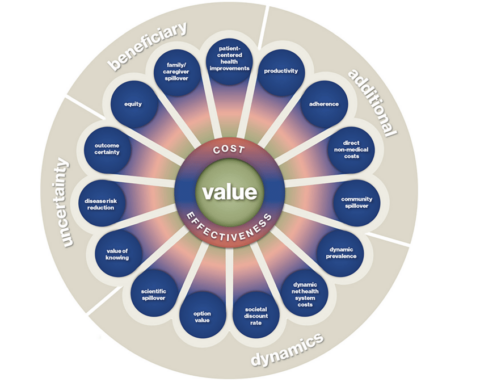If you want to search Cost Curve back issues or link to anything you read here, the web links and archive are online at costcurve.beehiiv.com. You can subscribe there, too.
One of the things we take as an article of faith over here at the Cost Curve headquarters is that obesity medicines are cost-effective. Period. Full stop.
I make that point over and over not because I think that it should end any discussion around the financial impact of the drugs but because I want to make sure that we’re having the right discussion around the financial impact of the drugs. (Which is to say, an adult conversation about tradeoffs and budget impact.) Debating cost-effectiveness is a distraction. A dead end.
So I was shocked, surprised, dismayed, etc. to see that Axios today — in its wrapup of folks concerned about the budget impact of obesity meds (though unconcerned about having the “tradeoffs” discussion) — included this line: “However, research has been mixed so far on how cost-effective the drugs are.”
And it included a hyperlink, too, to this study.
It’s a weird study to include, for at least three reasons.
It’s from 2022, which — in the context of obesity drugs — means it’s already way out of date and doesn’t come close to capturing outcomes data in heart disease, sleep apnea, etc.
It doesn’t include the medicines you think it would. Yes, it has semaglutide (Ozempic/Wegovy), but it doesn’t include tirzepatide (Mounjaro/Zepbound). it has three older medicines that are not, frankly, a part of the conversation right now.
MOST IMPORTANTLY, it suggests that semaglutide is indeed cost-effective. So the research is not really “mixed.” (I’m leaving out the point that ICER has told the New York Times that — yeah — even they agree that at current net prices, these meds are fine.)
It’s probably on-brand for me to go overboard on a single line in a single story, but it reflects a conscious choice on someone’s part to undersell the cost-effectiveness, and it means that someone who is paying close attention here is still missing the point.
And, boy, does that make it difficult to have the smart conversation we need to be having.
I’ve been remarking, haphazardly, on the IRA mentions during earnings season over the last couple of weeks, and I intend to keep flagging bits that I see that are important.
We’re halfway, give or take, through this earnings season, and it feels like we’re firmly in an era where the IRA is interesting only as far as it impacts earnings models.
BMS and Gilead dealt with questions about Medicare Part D benefit reform, and BMS acknowledged that the Eliquis price controls would be an important metric around future growth. Only J&J, so far, has offered any sort of higher-level philosophical comment on health policy, and even that statement was pretty anodyne. That’s kind of it.
I’m not expecting the second half to be wildly dissimilar. This week is, unofficially, obesity week, where we can expect some overreaction to Lilly (tomorrow) and Novo Nordisk (Thursday). Pfizer also hits this week, as does Amgen.
Still, as you think about the intersection (or the lack of intersection) between earnings and heaIth policy, I wanted to pass along a piece of context that might be helpful: Dentons Global Advisors put out a report after 4Q earnings season came to an end, assessing the amount of discussion of the IRA.
They tracked earnings calls for 12 different big pharma companies and found that the IRA came up on only four of them (AbbVie, BMS, Novartis, and Pfizer).
That confirmed an anecdotal sense that companies were just less interested in talking about the topic. (I explored this around J.P. Morgan, though in a more qualitative way.)
That might be the right move in the short term, but — at a time when policy risks (and opportunities!) are everywhere — I’d still love to see industry being a little more vocal about the world they’d like to see.
Because we’re talking about obesity drugs today: Politico has a story out quoting the head of the Congressional Budget Office as saying obesity meds need to take a 90% haircut off their net price to not increase the federal deficit.
“Not increasing the national deficit” is strange framing.
I mean, in theory, anything that’s not cost-saving increases the size of the national deficit. I took a tax deduction on printer paper this year, which in its own way, increased the national deficit by some infinitesimal amount (sorry, all!). So I don’t know what to make the CBO’s thinking here. I haven’t seen any numbers, either, so it’s impossible to know if this is short-term thinking or what.
Elsewhere:
Launch Pricing Alert: X4 Pharmaceuticals won approval for Xolremdi, a treatment for an ultra-rare condition (~1,000 patients in the United States) called WHIM Syndrome. The company said that most patients will be on a dose with a list price of $496,400 a year. The company was proactive in its disclosure, discussing the price — and the underlying value argument — on its conference call this morning.
The quote of the day comes from former NIH head Francis Collins, now helming the Biden administration’s effort to tackle hep C (via the NYT): “Anybody who tries to say, ‘Oh, it’s just the cost of the drug, that’s the only thing that’s gotten in the way,’ hasn’t looked at those lessons carefully.”
This is a thoughtful white paper from Avalere raising questions about the wisdom of the current IRA guidance, which calls for all medicines with the same active ingredient to be treated as the same drug, even if they’ve had their own separate development path and are marketed as separate medicines. The white paper raises, once again, the possibility that post-approval research will be disincentivized under the IRA. The report was underwritten by Novo Nordisk, which has a lot of skin in this game: Ozempic, Wegovy, and Rybelsus are all the same molecule, which means that all three of them will probably get price-controlled in the next round.
One more for the “340B is FUBAR” files: there’s a new analysis in JAMA Health Forum that suggests that the HHS plan for reimbursing 340B hospitals for lost revenue because of a court-rejected Trump-era policy will help rich hospitals and harm struggling ones.
Header image via Flickr user Stock Catalog.
If this email was forwarded to you, and you’d like to become a reader, click here to see back issues of Cost Curve and subscribe to the newsletter.





